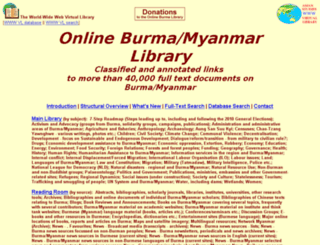Focal point
Location
The Online Burma/Myanmar Library (OBL) is a non-profit online research library mainly in English and Burmese serving academics, activists, diplomats, NGOs, CSOs, CBOs and other Burmese and international actors. It is also, of course, open to the general public. Though we provide lists of Burma/Myanmar news sources, the Library’s main content is not news but in-depth articles, reports, laws, videos and links to other websites, We provide a search engine (database and full text) and an alphabetical list of categories and sub-categories, but the Library is best accessed through browsing the 100 or so categories which lead to sub- and sub-sub categories. These tools should be used in combination.
Members:
Resources
Displaying 826 - 830 of 1151Refugee Protection in International Law
Contents:
List of annexes page viii...
Notes on contributors and editors ix...
Foreword xv...
Preface xvii...
Acknowledgments xx...
Expert roundtables and topics under the second track’ of the
Global Consultations xxi...
Table of cases xxii
Table of treaties and other international instruments xlv
List of abbreviations lv...
Part 1 Introduction:
1.1 Refugee protection in international law: an overall
perspective 3...
volker turk and frances nicholson
Pushing Past the Definitions: Migration From Burma to Thailand
Important, authoritative and timely report.
I. THAI GOVERNMENT CLASSIFICATION FOR PEOPLE FROM BURMA:
Temporarily Displaced; Students and Political Dissidents ; Migrants .
II. BRIEF PROFILE OF THE MIGRANTS FROM BURMA .
III REASONS FOR LEAVING BURMA :
Forced Relocations and Land Confiscation ;
Forced Labor and Portering;
War and Political Oppression;
Taxation and Loss of Livelihood;
Economic Conditions .
IV. FEAR OF RETURN.
V. RECEPTION CENTERS.
Myanmar Aquaculture and Inland Fisheries
ACKNOWLEDGEMENTS...
EXECUTIVE SUMMARY...
BACKGROUND TO THE MISSION:
International mission team members;
Myanmar fisheries sector...
MYANMAR - MISSION REPORT ON INLAND AQUACULTURE AND FISHERIES:
Myanmar - aquaculture and inland fisheries:


